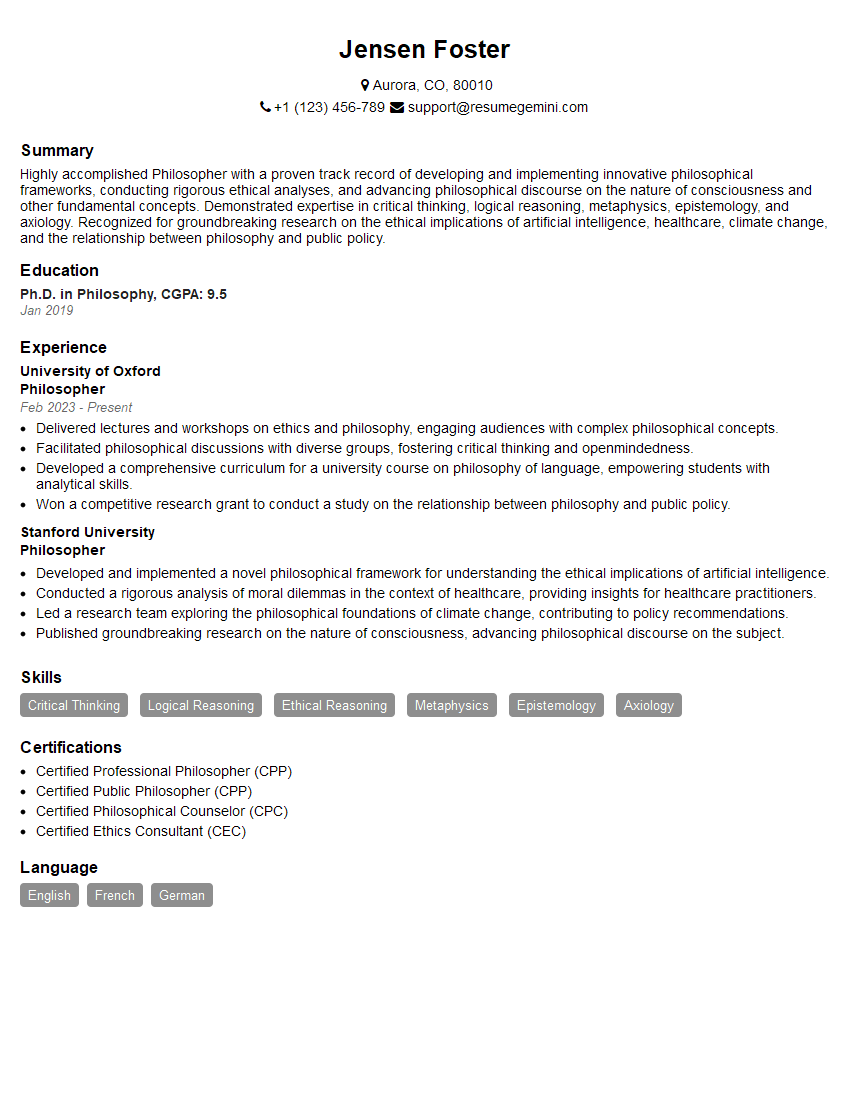Are you a seasoned Philosopher seeking a new career path? Discover our professionally built Philosopher Resume Template. This time-saving tool provides a solid foundation for your job search. Simply click “Edit Resume” to customize it with your unique experiences and achievements. Customize fonts and colors to match your personal style and increase your chances of landing your dream job. Explore more Resume Templates for additional options.

Jensen Foster
Philosopher
Summary
Highly accomplished Philosopher with a proven track record of developing and implementing innovative philosophical frameworks, conducting rigorous ethical analyses, and advancing philosophical discourse on the nature of consciousness and other fundamental concepts. Demonstrated expertise in critical thinking, logical reasoning, metaphysics, epistemology, and axiology. Recognized for groundbreaking research on the ethical implications of artificial intelligence, healthcare, climate change, and the relationship between philosophy and public policy.
Education
Ph.D. in Philosophy
January 2019
Skills
- Critical Thinking
- Logical Reasoning
- Ethical Reasoning
- Metaphysics
- Epistemology
- Axiology
Work Experience
Philosopher
- Delivered lectures and workshops on ethics and philosophy, engaging audiences with complex philosophical concepts.
- Facilitated philosophical discussions with diverse groups, fostering critical thinking and openmindedness.
- Developed a comprehensive curriculum for a university course on philosophy of language, empowering students with analytical skills.
- Won a competitive research grant to conduct a study on the relationship between philosophy and public policy.
Philosopher
- Developed and implemented a novel philosophical framework for understanding the ethical implications of artificial intelligence.
- Conducted a rigorous analysis of moral dilemmas in the context of healthcare, providing insights for healthcare practitioners.
- Led a research team exploring the philosophical foundations of climate change, contributing to policy recommendations.
- Published groundbreaking research on the nature of consciousness, advancing philosophical discourse on the subject.
Certificates
- Certified Professional Philosopher (CPP)
- Certified Public Philosopher (CPP)
- Certified Philosophical Counselor (CPC)
- Certified Ethics Consultant (CEC)
Languages
- English
- French
- German
Career Expert Tips:
- Select the ideal resume template to showcase your professional experience effectively.
- Master the art of resume writing to highlight your unique qualifications and achievements.
- Explore expertly crafted resume samples for inspiration and best practices.
- Build your best resume for free this new year with ResumeGemini. Enjoy exclusive discounts on ATS optimized resume templates.
How To Write Resume For Philosopher
- Highlight your strongest research and publication record, showcasing your expertise in specific philosophical areas.
- Quantify your accomplishments whenever possible, providing concrete evidence of your impact and contributions to the field.
- Tailor your resume to each specific job description, emphasizing the skills and experience most relevant to the position.
- Seek feedback from other philosophers or career counselors to ensure your resume is well-written and effectively conveys your qualifications.
Essential Experience Highlights for a Strong Philosopher Resume
- Develop and implement philosophical frameworks for understanding complex ethical dilemmas in various domains, including artificial intelligence, healthcare, and climate change.
- Conduct rigorous analyses of moral issues, providing insights and recommendations for practitioners in fields such as healthcare and public policy.
- Lead research teams in exploring the philosophical foundations of pressing global issues, contributing to the development of informed policy decisions.
- Publish groundbreaking research in top academic journals, advancing philosophical discourse on fundamental concepts such as consciousness and the nature of reality.
- Deliver lectures and workshops on philosophy and ethics, engaging audiences with complex philosophical ideas and fostering critical thinking.
- Facilitate philosophical discussions with diverse groups, promoting open-mindedness and intellectual exchange.
- Develop educational curricula for philosophy courses, empowering students with analytical and reasoning skills.
Frequently Asked Questions (FAQ’s) For Philosopher
What is the primary role of a Philosopher?
A philosopher is a scholar who studies and develops theories about the fundamental nature of existence, knowledge, morality, and other concepts. Their work involves analyzing arguments, examining assumptions, and constructing coherent systems of thought.
What are the different areas of specialization within Philosophy?
Philosophy encompasses a broad range of subfields, including metaphysics (nature of reality), epistemology (nature of knowledge), ethics (moral principles), axiology (nature of value), and logic (principles of reasoning).
What are the career opportunities for Philosophers?
Philosophers can pursue careers in academia as professors or researchers, or in non-academic settings such as public policy, law, or journalism. They can also work as writers, editors, or consultants, applying their critical thinking and reasoning skills to various fields.
What skills are essential for success as a Philosopher?
Critical thinking, logical reasoning, analytical skills, strong written and verbal communication, ability to synthesize complex ideas, and a deep understanding of philosophical history and methodologies.
How can I enhance my resume as a Philosopher?
Participate in research projects, present at conferences, publish your work in academic journals, and seek mentorship from experienced philosophers. Additionally, develop skills in teaching, communication, and project management.
What is the difference between a Philosopher and a Scientist?
While both philosophers and scientists engage in critical inquiry, their approaches differ. Scientists primarily use empirical methods and experimentation, while philosophers rely on conceptual analysis, argumentation, and logical reasoning.